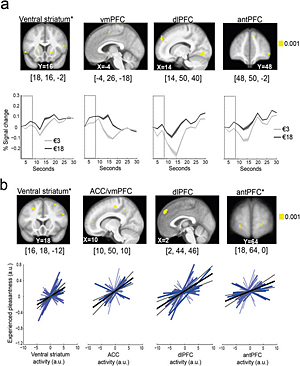Wine mind tricks
Do most people think wine tastes better if they believe it costs more? This hypothesis seems obvious enough to declare it so without extensive additional study.
Just in case you were in any doubt, though, researchers at the business school INSEAD (the international Business School for the World) and the University of Bonn in Germany seem to have verified the obvious. Thanks to an extensive series of tests involving volunteers who squeezed into MRI machines and sipped wine through tubes while having their brain function scanned, researchers found a clear connection: Test subjects judged wine as tasting better when they were told it cost more.
 According to an article about the study in Time magazine on Aug. 16, a total of 30 people each tasted three different wine samples while lying in the MRI. The tastes were divided into 108 tiny samples of just 1.25 milliliters each - less than one standard glass of wine in all - over a 90-minute period.
According to an article about the study in Time magazine on Aug. 16, a total of 30 people each tasted three different wine samples while lying in the MRI. The tastes were divided into 108 tiny samples of just 1.25 milliliters each - less than one standard glass of wine in all - over a 90-minute period.Before each taste test, Time writer Amanda MacMillan wrote, each subject was told how much the bottle cost: either 3€, 6€ or 18€ per bottle. In fact, all the wines really came from the same bottle, a 12€ ($14) red wine.
To no one's great surprise, subjects tended to rate the samples that they thought were more expensive as better tasting than the "cheaper" samples. However, this effect was limited in that a very low-quality wine with a high price still won't be perceived as equivalent to a very good wine with a lower price.
What does this imply for wine lovers? According to Time - and I strongly agree - The best way to evaluate wine - or chocolate, coffee or any type of food or beverage that varies widely in price and quality - is to sample it before you know the cost. Hilke Plassmann, associate professor of marketing at INSEAD and a co-author of the study, added, "If you want to get at your enjoyment of the product itself, then a blind consumption is best."
Want to read more about this study? For the Time magazine report, click this link. If you'd like to dive into the primary sources, you'll find the full study online at Nature.com's Scientific Reports: "How context alters value: The brain's valuation and affective regulation system link price cues to experienced taste pleasantness."

